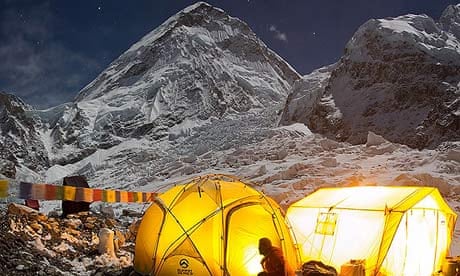A British climber and two companions confronted on Everest by an angry mob are returning home after deciding they no longer feel safe enough to stay on the mountain.
Speaking from Lukla, the town that acts as gateway to the Everest region, Jon Griffith told the Guardian of the moment when a group of up to 100 Sherpas confronted them about an argument higher up the mountain. "It was obvious there would be no talking or negotiation," he said. "They crested the ridge of moraine above our tent. They had pulled their scarves over their faces and instantly bent down to pick up rocks."
Griffith said that without the bravery of half a dozen other climbers at Camp 2, he and his two partners – the Swiss alpinist Ueli Steck and the Italian Simone Moro – would have been killed in the incident on Saturday. He praised the American climber Melissa Arnot, the only woman to have climbed Everest four times, who warned them an attack was imminent.
He said: "Melissa was a real heroine. She saved Ueli's life. Without her, he'd be dead. She explained to us in our tent that there was a big mob out looking for us. She said something terrible must have happened. We explained that words had been exchanged but that was it. She stepped out of the tent for a moment and then shouted: 'They're coming, get out of here.'"
Griffith said that with the protection of Arnot and other western climbers they edged backwards. "We were terrified but we knew if we ran they would be after us. We got kicks and punches and Ueli got a rock in the face. One of the Sherpas pulled a knife on Simone, but he managed to turn and the knife hit his hip belt.
"There was a 50-minute period where we all thought we were going to get stoned to death. I kept saying I don't understand what's happening. When we explain the whole story it sounds like a Hollywood exaggeration."
Thanks to mediation by Arnot and the other western climbers, Griffith, Steck and Moro escaped Camp 2 but avoided the established route through the dangerous Khumbu icefall, preferring to descend the glacier where there was no trail.
"We were running with no ropes on and there are a ton of huge crevasses there. But it felt safer," said Griffith. "There were lots of Sherpas standing on the moraine watching us, but we knew they wouldn't follow. It was as sketchy as hell."
Since returning to base camp, Griffith said he had been talking to commercial expedition leaders and Sherpa community leaders about what happened.
"There's an underlying feeling among the Sherpas that they've been treated quite badly by westerners and that clients don't have any respect for them. If you look around at how incredibly luxurious some base camps are, you can see their point," he said.
"It's not that we pissed them off and there was a fight. This is 10 or 20 years of frustration spilling out. Mob rule shouldn't happen anywhere, let alone Everest, but something needs to change."
Griffith said that allegations he and his companions had injured a Sherpa by kicking ice on to them from above were false. "We were climbing 50 metres off to one side," he said.
But he acknowledged that Moro had called one of the Sherpas a "motherfucker" during the argument. "Saying that to a Nepalese is just about an act of war, but we apologised for that."
The three climbers, who were planning to climb a new route on Everest, have faced criticism from western guides. The American expedition leader Adrian Ballinger, currently leading clients on the mountain, said that "even if no rock or ice actually was knocked off by the professional climbers, and even if no rope-fixing Sherpa was injured, there was still a perception of disrespect for the effort".
"No one told us that the Sherpas were fixing ropes and that we shouldn't go up," Griffith said. "We were told by an American guide that the Sherpas were working and not to clip into their ropes. That was completely acceptable. We're more than capable of climbing without them.
"People have been telling us that we were disrespectful but we weren't. Simone has been here so often and done so much, rescuing people for free and so forth. Ueli climbed Everest last year with a Sherpa, as equals. He's really upset by this, and doesn't understand it. The same guys he was laughing with last year were throwing rocks at him at Camp 2."
On Tuesday, the Nepalese authorities attempted to resolve the issue by trying to get all parties to agree that mistakes were made and that no more violence would take place.
But Griffith and his companions have decided to head home. "People seem shocked that we're going home, but what happened up there was unbelievable. Getting back into climbing after that is too much. We don't feel safe above base camp anymore. People at base camp were guaranteeing our safety but I don't know how you do that up there."
Nepalese police have detained three Sherpas, but Griffith has yet to be interviewed. "We'll talk to the authorities in Kathmandu. But apart from Simone swearing, we don't feel we have anything to apologise for."
He said the confrontation would only entrench the tensions on Everest. "That's the issue that everyone at base camp will now have to resolve. They'll have to listen to the Sherpas. I don't know how this will affect Everest. Part of me thinks the show will always go on. The only way things will change is if the money stops coming in."











Comments (…)
Sign in or create your Guardian account to join the discussion